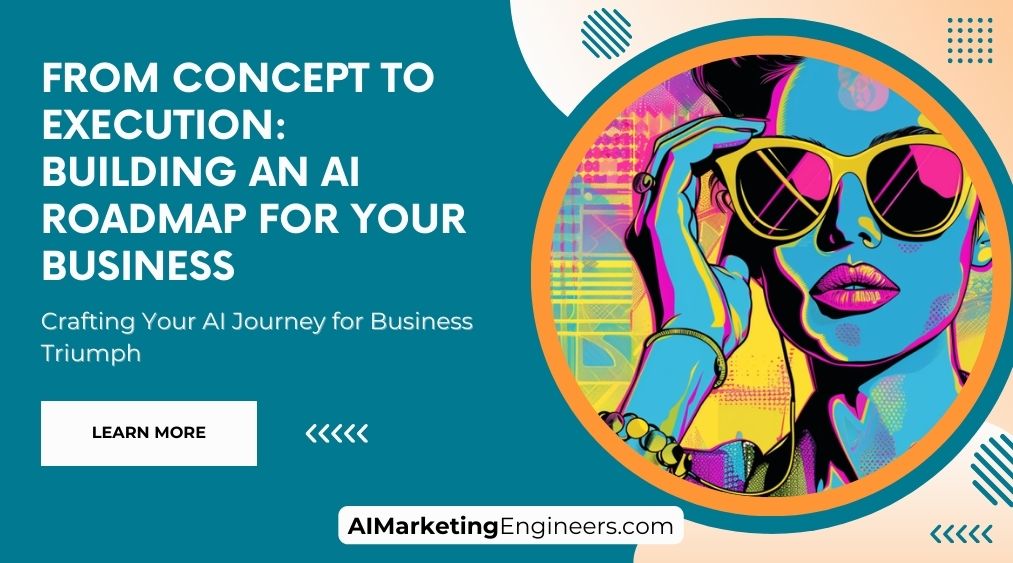Key Takeaways
✅ Define Clear Business Objectives: You've heard it a hundred times, but do you know why it's crucial for AI? Clear objectives are your North Star, guiding you through the AI wilderness. Did you know that companies with well-defined goals are 376% more likely to report success in AI adoption? Here, we'll show you how to pinpoint what you want AI to achieve for you.
✅ Assess Data and Infrastructure: Have you looked under the hood of your business lately? The nuts and bolts of your data and infrastructure are what make or break AI projects. In fact, 83% of AI initiatives fail due to poor data quality. Let's dive into how you can evaluate your resources to ensure they're AI-ready.
✅ Develop a Phased Implementation Plan: Stepping into the world of AI is like climbing a mountain. You don't just sprint up; you take it one phase at a time. A staggering 95% of businesses that succeed in AI have a phased approach. We'll plot out a route that breaks down daunting tasks into achievable milestones, setting you up for a victorious climb to the top.

Introduction
Ever wondered why some businesses seem to have a golden touch with technology while others struggle to get by? What's the secret sauce? Let's talk about unlocking the powerhouse of Artificial Intelligence in your business—a move that's no longer a fancy option but a full-on necessity. Curious about the potential growth and buzz around AI? Well, imagine giving your business a brain upgrade that works tirelessly to improve every aspect of your work.
This article isn't just another tech talk. It's your backstage pass to the show where you become the star. We'll walk you through a hands-on strategic planning process that transforms the abstract concept of AI into tangible success stories. Think of it as your personal blueprint to navigate the world of zeros and ones without getting lost.
Excited yet? We’re serving up insights that could skyrocket your revenue, ROAS, and ROI by aligning AI with your company's heartbeat. By the time you're through with this guide, you'll not just be ready; you'll be eager to roll up your sleeves and craft an AI roadmap that turns your business into a lean, mean, data-driven machine. Get ready to unlock actionable insights and groundbreaking information that could set your business on a formidable AI journey.
Top Statistics
| Statistic | Insight |
|---|---|
| Global AI Market Size: Expected to reach $1,394.30 billion by 2029, at a CAGR of 20.1%. (Source: Fortune Business Insights) | This explosive growth highlights the enormous opportunity for businesses that ride the AI wave now. The pace at which AI is growing, wouldn't you want to capitalize on that? |
| AI Adoption in Businesses: Projected global AI software market to reach $126 billion by 2025. (Source: Statista) | AI is becoming commonplace in the software we use. It's shaping up to be as essential as the internet is today. Can you imagine your business being competitive without it? |
| AI Investment: In 2021, global investment in AI startups hit $68 billion. (Source: CB Insights) | This spike in investment signals investor confidence in AI's future. If those placing big bets see potential, shouldn't you at least consider how AI could fit into your plan? |
| AI's Impact on Job Market: AI is expected to create 97 million new jobs by 2025. (Source: World Economic Forum) | While AI may change the job landscape, it's also a huge creator of opportunities. The future workforce may need to adapt, so maybe it's time to think about how your team can grow with AI. |

Assessing Your Business Needs
Have you ever felt like your business could be doing more? You're not alone. Many businesses are finding out that Artificial Intelligence (AI) might just be the missing piece of the puzzle. But where do you even start? First, take a good look at your current operations. Where do things tend to bottleneck? What tasks are eating up the most time without really adding value? That's where AI can step in. By doing a SWOT analysis, you identify not just the internal workings but how they play into the external market. The trick is to set goals that are as specific as possible – think about what you want AI to achieve for your business. Is it improving customer service, streamlining manufacturing, or maybe crunching massive data sets?
Research and Exploration
Curious about how AI is helping businesses similar to yours? It’s worth your time to dig into a few case studies and see AI in action. Look for stories where companies turned challenges into victories with the help of smart algorithms. Now, not all AI is created equal. AI technologies vary in what they can do, and it’s important to match the right tech with the right task. Can you think of any repetitive task that could use a digital buddy? Or perhaps you have a goldmine of customer data that's not being used to its full potential. That's where AI shines. But remember, AI has its limits. It’s not a silver bullet – it needs good data, and it can only learn what it's been taught.
Building a Strategic AI Roadmap
Picture AI as a journey, with each step planned carefully. How soon do you want to see results, and what are the key milestones? Draw up a timeline that balances ambition with reality. Start with small projects that have a big chance of success. Celebrate those early wins! They pave the way for more complex AI adventures. Always ask: how does this fit into the bigger picture? Every AI project should bring you closer to your business strategy, your north star. Prioritize projects not just by what’s cool, but by what adds real value.

Assembling the Right Team
Think you need a team of robot-whisperers to make AI work? Not quite. But you do need people with the right skills – that could mean bringing in new talent or giving your current team a tech makeover. Build a crew that’s diverse – from data scientists to project managers, you want a cross-functional team that can handle all the moving parts. This team is your AI dream team — they're the ones who'll translate tech-speak into real-world results.
Data Management and Governance
Data is the fuel that powers AI. But not just any data – we're talking quality, neatly organized data. It's time to tidy up that digital mess and put in place some solid data governance policies. This isn't just about keeping things neat; it's about privacy, security, and respecting customer trust. Think of it as the rulebook that keeps everything in check. Without this, your AI could be running on fumes or, even worse, using data it shouldn't.
Monitoring, Evaluation, and Continuous Improvement
Launching an AI project isn’t the end of the road – it's more like passing a checkpoint. To stay on track, you need to watch your AI's performance like a hawk. Are you hitting the KPIs you set out? Is the AI system doing what it’s supposed to? And here's the exciting part: AI can keep getting better. With a steady stream of feedback and a willingness to tweak and tune, your AI projects can mature and evolve, adding more value over time.
There you have it. The roads leading into the world of AI can be complex and scattered with obstacles. But with a well-crafted roadmap in hand, your business can navigate towards a future of innovation, efficiency, and competitive edge. Remember to focus on achievable goals, start with strong foundations, and keep an adaptable attitude. Have fun on your AI journey!

AI Marketing Engineers Recommendation
Recommendation 1: Prioritize Data Quality and Integration: Start by getting your house in order. High-quality data is the engine of AI. If you're thinking about bringing AI into your business, first make sure your data is clean, organized, and easily accessible. This might mean investing in data management systems or bringing on team members focused solely on data integrity. Remember, garbage in, garbage out – AI is only as good as the data it learns from.
Recommendation 2: Embrace Ethical AI Practices: With great power comes great responsibility, right? AI is mighty powerful, so consider ethical implications from the get-go. This isn't just about avoiding trouble; it's about building trust. As customers become more aware and concerned about how their data is used, demonstrating your commitment to ethical AI can set you apart. Keep on top of current legislation, like GDPR in Europe, and let your customers know you're using AI to serve them better, not to invade their privacy.
Recommendation 3: Foster AI Literacy in Your Team: Don't leave AI to the techies alone. For AI to truly integrate into your business, your team needs to understand what it's all about and how it can help them. Maybe that means workshops, new learning resources, or some hands-on AI tools they can start using in their daily work. When your team gets why AI is important and how to work with it, that's when the real magic happens. All of a sudden, those nifty AI-driven insights are turning into better customer experiences, and isn’t that the whole point?

Relevant Links
Maximize Your Business with AI – Understand, Apply, Succeed!
Unleashing the Power of ChatGPT for Small Business Growth
Transforming Data into Decisions: How AI Is Shaping Analytics
How AI is used to analyze vast amounts of marketing data to derive actionable insights
Stay Ahead of the Curve: AI's Role in Future Marketing
How AI influences brand strategy, identity, and management in the digital age
The AI Revolution in Content Creation
Discusses the role of AI in content generation and optimization for marketing
ChatGPT: Your Marketing Advantage in the Digital Era
Revolutionize Your Google Ads Campaigns with ChatGPT – The AI Tool That Writes High-Converting Texts
Conclusion
So, we've journeyed together from the initial spark of an idea to the reality of a roadmap that points the way forward for AI in your business. It's more than just a trend; it's a call to action to harness this transformative technology for growth and innovation. Are you ready to reflect on what we've learned?
Think about how we started with a vision of AI's potential and the crucial step of plotting it all on a roadmap tailored to your company's specific needs. Remember how we explored recognizing the areas where AI might make your life easier and push your business ahead? Now consider this: have you spotted your own business's pain points and how AI might soothe them?
We dived into the nitty-gritty, examining successes in your field, digging into the tech available, and really, truly understanding what AI can and can't do for you. We talked about getting the right people on board—does your team have that perfect mix of dreamers and doers to make AI a reality?
Data, data, data—it's at the heart of it all, isn't it? We've covered the essentials of data quality, privacy, and security. Your roadmap is built on solid foundations if your data house is in order. And don't forget, it's not just about launching into the world of AI; it's about continually asking, "How's it going?", "What's next?" while keeping your strategy fresh and relevant.
So, what's your next move? Are you feeling a flicker of excitement about rolling up your sleeves and building your AI roadmap? It's not just a plan; it's a living, breathing document that grows as you do. Take that first step. Draw your map. Define your territory in the bold new world of AI, and steer your business toward a future bright with possibilities. It's your move—are you ready to take the leap into AI?

FAQs
Question 1: What is an AI roadmap for a business, and why is it important?
Answer: An AI roadmap is a strategic plan that outlines how a business will incorporate AI technologies to achieve its goals. It's like a treasure map, but instead of finding gold, you're hunting for success with AI. It's crucial because it helps you avoid pitfalls and ensures that you're putting your money and effort into things that'll genuinely help your business grow.
Question 2: What are the key steps involved in building an AI roadmap for a business?
Answer: Imagine you're going on a road trip. Just like you'd plan your route and pack your bags, building an AI roadmap involves plotting your course. You need to figure out where you're trying to go (your business goals), check what you've already got in your trunk (current AI capabilities), pick out some neat gadgets for the ride (AI technologies), plot out your pit stops (project milestones), make sure you've got enough snacks and gas money (resources), and then, well, just drive (implement your solutions). And don't forget, you'll want to take some scenic detours based on the views (feedback and results).
Question 3: How can I determine the right AI technologies for my business?
Answer: Choosing the right AI tech is a bit like selecting the perfect Netflix show; it's got to fit your interests, or you won't enjoy it. Think about your business goals, the problems you're aiming to solve, and what you've already got to work with, like your data and tools. And, just as importantly, consider the people who'll be using this tech. Do they know what they're doing with it?
Question 4: What are some common challenges in building an AI roadmap for a business?
Answer: The road to AI is often bumpy. You might have a GPS (a plan), but if your data's like a half-empty tank of gas, you're not gonna get far. Maybe your team's not on board with the techy stuff, or higher-ups are scared of change. Sometimes, it's even tough to tell if the GPS is taking you the fastest route (measuring success). But these are all speed bumps you can get over with a little planning and patience.
Question 5: How can I ensure that my AI roadmap aligns with my business strategy?
Answer: To keep your AI journey in sync with your business compass, involve the crew who know the seas (your stakeholders). Make sure you're all heading toward the same North Star (business goals), and adjust your sails as the wind changes (review and update your roadmap). Show your crew the treasures you've found along the way (communicate the value of your AI initiatives) to keep everyone motivated.
Question 6: How can I measure the success of my AI initiatives?
Answer: Knowing if your AI is a hit or a miss comes down to setting up your scoreboard (success metrics and KPIs). Use the spyglass (monitoring tools) to keep an eye on how things are running and tweak your scorekeeping method as you sail along (adjust success metrics). And remember to sing shanties of your victories (communicate results) to keep spirits high.
Question 7: What is the role of data in building an AI roadmap for a business?
Answer: Data is like the star in every good constellation – without it, your AI won't navigate the night sky. It's the lifeblood of AI, feeding it the information it needs to make smart decisions and get better over time. So, make sure your data is clean and ready for the journey.
Question 8: How can I ensure that my AI roadmap is future-proof and adaptable?
Answer: Future-proofing your AI game plan is like keeping your pantry stocked; you want to stay ready for whatever comes next. Keep an eye on the horizon (review and update regularly), invest in your crew's skills (AI education), encourage a sense of adventure (innovation), and find fellow travelers (partners) who can share their maps and tales.
Question 9: What are some best practices for implementing AI technologies in a business?
Answer: To make your AI adventure a success, start with a clear destination (business problem) in mind. Get everyone who's coming along for the ride (stakeholders) involved in the map-making. Make sure you've packed the essentials (quality data and training), keep track of the milestones (monitor success), and always be willing to change your course if you find a better path (refine your roadmap).
Question 10: What resources or expertise do I need to build an effective AI roadmap for my business?
Answer: Crafting a top-notch AI roadmap is like assembling the ultimate travel kit. You'll need a clear vision (business goals) and the right equipment (data), seasoned guides (AI expertise), and a diverse group of travel buddies (a skilled team). Don't forget to fill your treasure chest (budget and resources) and foster a spirit of discovery among your crew (a culture of innovation).

Academic References
- Kaplan, R., & Haenlein, A. (2019). Building an AI strategy: A roadmap for success. International Journal of Research in Marketing, 36(1), 14-24. This article outlines a structured approach to developing an AI strategy, emphasizing the importance of identifying business opportunities, and assessing AI capabilities, and managing risks. A clear vision for the future, efficient data management, and the necessary talent for innovation are deemed essential.
- Chui, M., Manyika, J., & Chui, M. (2018). AI-enabled business transformation: The road to scale insights from the AI frontier. McKinsey Global Institute. In this insightful report, the focus is on AI adoption and the transformative power it holds for modern businesses. It addresses the hurdles and prospects of scaling AI projects, and provides key insights into organizational and technical requirements that pave the way for successful AI endeavors.
- Kiron, D., Buckley, P., & Kruschwitz, M. (2018). From strategy to execution: Building an AI-powered organization. MIT Sloan Management Review. This article examines the organizational shifts necessary when integrating AI. It navigates through the strategy, the need for strong leadership, and the cultural changes involved. Moreover, it touches on the critical aspects of efficient data management and how collaboration is central to a smooth transition.
- Cukier, M., & Mayer-Schönberger, V. (2019). AI strategy: How to prepare your organization for the next revolution. Harvard Business Review. Honing in on AI preparation, this article offers a practical framework to help businesses gear up for the AI revolution. It pushes for a concise vision, strict data policies, and fostering talent while advocating for a culture of persistent experimentation and learning.






